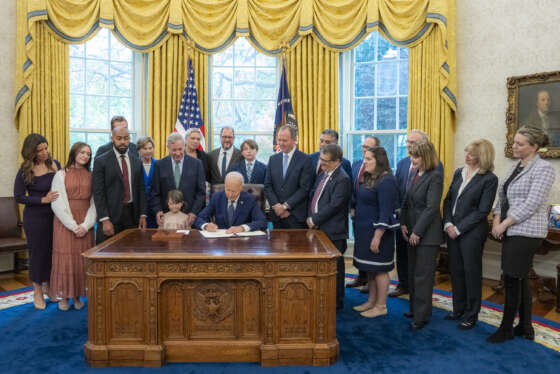Survey: CHCOs worry about retaining committed workforce
Retaining good employees in spite of pay freezes and cuts to employee benefits will be the biggest challenge facing agency human resources officials next year. ...
Retaining good employees in spite of pay freezes and cuts to employee benefits will be the biggest challenge facing agency human resources officials next year.
That’s more of a concern to chief human capital officers than either hiring new workers or upgrading technology to make their jobs easier, according to responses to a survey Federal News Radio conducted earlier this month asking agency chief human capital officers a series of questions about their 2012 priorities.
Federal News Radio sent the anonymous survey to 49 agency CHCOs and received 10 responses, more than a 20 percent response rate.
“Cuts/freezes are making it tougher every day to attract and retain talent,” one respondent said.
Budget concerns pervade the survey results. Respondents said pay freezes and reductions in employee benefits would present bigger challenges for them than cuts to program budgets. But they also indicated that agencies may delay supervisor training and technology improvements as they try to stretch their resources as far as they can go.
“Uncertainty leads to inaction,” another respondent said.
Kathryn Medina, executive director of the Chief Human Capital Officers Council at the Office of Personnel Management, said retention of talent plays into those overall budget issues.
| Perhaps it’s no surprise that agency human resources leaders told Federal News Radio that their top priority and challenge in 2012 would be the same thing: recruiting and retaining employees with less money. |
 |
| Brodi Fontenot Deputy Assistant Secretary for Administration Department of Transportation
|
 |
| Reginald Wells Deputy Commissioner for Human Resources Social Security Administration
|
 |
| John Sepulveda, Assistant Secretary for Human Resources and Administration Department of Veterans Affairs
|
 |
| Mike Kane Chief Human Capital Officer Energy Department
|
 |
| Robert Buggs Chief Human Capital Officer Education Department
|
“You’re talking about very tight budgets and limited resources, and it’s definitely more cost-efficient to keep good talent,” she said.
But there are also effective strategies for retention, she added. “I think there are things you can do to boost employee morale or retention, and a lot of them are non-monetary.”
Pay is only one facet of morale, she said, alongside employees work, autonomy and responsibilities.
2012 priorities and concerns revolve around workforce
Forty percent of survey respondents said the biggest HR challenge facing their agency is the pay freeze and cuts to employee benefits that make it hard to recruit and retain talent.
Some agencies are struggling under hiring freezes.
“Right now, we’re losing staff like crazy and we can’t backfill,” said one respondent in response to a question about the personnel policy changes they would like to make. “I would lift the ‘hard freeze’ to make it possible to hire to fill vacancies, even on a ‘1 for 2’ basis.”
Twenty percent said cumbersome technology was their chief concern.
“It’s way past time for more consolidation of services and investment in technology,” another respondent said.
Another 20 percent said they were most concerned about supervisors that lacked management training.
The CHCO Council’s Medina said one possible solution on the training front is OPM’s HR University, which launched early this year with the goal of training agency HR officials.
However, its mission has broadened, Medina said, to also include training agency managers and supervisors. “And sharing that training, which means saving resources and leveraging our training dollars,” she added.
Performance management
That finding reinforces feds’ concerns that their bosses and supervisors do not deal with poor performers, as revealed by the 2011 Employee Viewpoint Survey.
Federal News Radio asked CHCOs to suggest the best way to fix the problem — 40 percent of respondents said the solution should come from the top. Agency leaders should demonstrate that performance management is critical to the agency’s mission, they said.
Thirty percent said supervisors should have more training in personnel management.
One respondent recommended that agencies should “offer mandatory training to managers and hold them accountable in performance plans and in progress reviews.”
Ho-hum relationship with OPM
The survey also revealed a ho-hum relationship between CHCOs and OPM.
OPM was a trusted advisor and resource on HR issues to a “moderate” or “very limited” extent, said eight of nine respondents to a question about OPM’s relationship with their agency.
One respondent complained that OPM required agencies to report a “ridiculous” amount of training data, but never used it to issue a report.
Another would like agencies to be able to offer early retirements or buyouts without going through OPM or the Office of Management and Budget.
But, overall, CHCOs stood by one of their most controversial decisions this year: to have OPM take control of the federal hiring website USAJobs from contractor Monster Government Solutions.
Job seekers had so many problems with OPM’s site that lawmakers held a hearing on the agency’s IT capabilities.
More than half of the survey respondents said they believed moving USAJobs to OPM was the best choice for their agency by either a “great” or “moderate” extent. But nearly half, 44 percent, said they were not sure. Answers were evenly split on a question asking whether their agency had had problems with the new USAJobs.gov when it first launched.
“Our HR Department didn’t have as many issues as end users did,” one said.
Hiring reform
Sixty percent of respondents said that hiring reforms designed to cut the time it takes to fill a vacancy had helped them recruit and retain talent to “a moderate extent.”
“We have had no problems implementing the required reforms, however, these reforms have not resulted in a better process for applicants or the hiring managers,” one respondent said.
Half are concerned that a stovepipe culture, in which human resources staff and hiring managers do not work together very well, is impeding progress, however.
Three of the 10 mentioned that “cumbersome HR technology systems” get in the way of implementing hiring reforms.
Another said the process could be improved. They said it should “eliminate applicant self scoring and allow hiring managers to rate the applicants based on their hiring requirements.”
Some respondents indicated more policy changes were needed.
“We need to review the current laws and regulations and modify them to model private industry hiring standards,” one said.
Another said they would like veterans’ preference regulations to be overhauled.
“While I have a great respect for our military and support our troops, VA Preference regulations are outdated and prevent agencies from hiring applicants who are sometimes more qualified than veterans,” they commented.
The proposed Pathways program, which would replace various internship and trainee offerings, would be most helpful in allowing agencies to both “hire more quickly than through the competitive hiring process” and “recruit young talent in particular,” respondents said.
But, one noted, “Pathways will only be helpful when the hiring freeze is lifted. Right now, we can’t hire at all.”
Despite the overall gloomy attitude that answers reflected, some respondents noted a silver lining in the federal human resources outlook for 2012.
“Given the complex social, political and statutory environment in which we work, we do a great job,” one said.
Medina echoed that sentiment, adding that human capital issues are “becoming more mainstream in terms of top-level management and decision-making.”
RELATED STORIES:
OPM survey shows feds upbeat despite challenges
OPM highlights hiring reform best practices
OPM working ‘around the clock’ to fix USAJobs.gov
OPM outlines students’ fast track to government jobs
Copyright © 2024 Federal News Network. All rights reserved. This website is not intended for users located within the European Economic Area.






